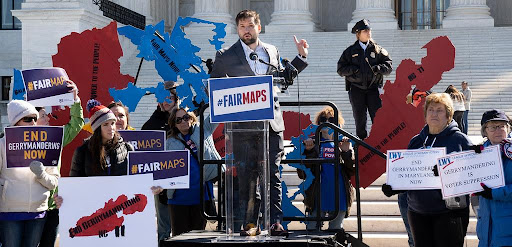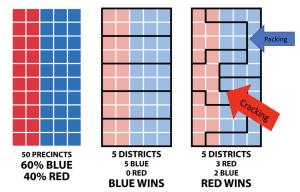The following represents the opinion of the student reporter and does not represent the views of Loyola University Maryland, the Greyhound, or Loyola University’s Department of Communication.
The United States is divided into 435 districts that elect the U.S. House of Representatives, and hundreds more which elect state representatives. In the modern day, this subjects these districts to what is known as gerrymandering.
According to Miriam Webster, gerrymandering is, “The practice of dividing or arranging a territorial unit into election districts in a way that gives one political party an unfair advantage in elections.” This has the ability to take an area that, by popularity, would vote for one party, and divide them in a manner that arranges for the other party to win.
There are a few steps and main strategies that redistricting architects use to influence the election. Firstly, the party must be in power within the state legislature to affect the redistricting maps. Secondly, in some states, the governor must also pass or veto the redrawn map. Once these steps are in place, the factors of cracking/stacking and packing can take place.
Graphic Model via Wikimedia Commons
- Cracking is the process of splitting, usually, a densely populated minority area into fractions, and attaching a predominantly white, suburban, area for the purpose of outnumbering the minorities’ votes.
- Stacking, relatedly, is lumping in an entire minority population with an even larger white population to water down the effect of the minority votes.
- Packing is the strategy of placing all the minorities you can into one district so that they can win that district by a landslide but have no influence on any other.
This practice has no place in American democracy. American democracy was established in spite of tyrannical rule from a monarchy. Politicians and groups who partake in gerrymandering undermine this sentiment and encourage underrepresentation of citizens as well as a dangerous consolidation of power. In other words, it allows for a group that fairly gained power in our elections to hold power unjustly.
This process has been used by both parties. It developed concurrently with the long history of racism in America and the civil rights movement. Dr. Douglass Harris, a professor of Political Science at Loyola and expert of American Elections, spoke on the topic.
“It opened up the possibility that those seeking to perpetuate race-based differences and to discriminate against Black Americans would redraw maps aimed at diluting overall representation for African-American constituencies,” Dr. Harris said.
This practice was officially outlawed following a very controversial Supreme Court Case in 1995, Miller v. Johnson. This case split the court but did officially determine Georgia’s Republican redistricting between 1980 and 1990 as racially motivated. However, these cases of racially motivated redistricting maps have appeared since. Currently, the case of Merrill V. Milligan, is at a standstill in the Court. This case alleges that Black voters in Alabama have been packed together into a single district in order to minimize their voting power.
“Even as the courts have looked askance at such manipulations when they are made explicitly on the basis of race, those same discriminatory political forces have redrawn maps in processes where, though they explicitly trained themselves not to talk in racial terms,” Dr. Harris said, “Nevertheless it seemed to have the same racially discriminatory intent and certainly had the same overall effects of diluting black voting power,”.
Courts have limited redistricting architects from speaking in matters of race, however they continue to perpetuate this divide through other factors. Map makers divide the areas based on partisan lines and weigh elections in the favor of the ruling regime. This can cause a gridlock of the American democratic system. This results in what we are seeing today, parties in power are continuing to influence elections and consolidate power undemocratically.
Erin Conn ‘23, a political science student at Loyola, understands the ubiquity of gerrymandering in the U.S. and thinks it’s wrong,
“The ability of politicians to redraw district lines in a partisan manner is a major oversight of the American system of government. Every person should be adequately represented, but they shouldn’t be shuffled around or judged based on skin color,” Conn said.
Gerrymandering may seem to be an exclusively Republican activity, however, in the Maryland State Legislature, there have been accusations of Democrat gerrymandering. The 6th Congressional District of Maryland underwent an extreme change following the 2010 census. According to the census, this district was overpopulated by 17,414 people. The district was redrawn as a result. This redistricting however was not the simplest path to accommodate the overpopulation The map planners relocated a total of 711,162 Maryland citizens. This redistricting brought 353,088 new people into the district, and expelled 358,074 people to other districts, mostly District Eight. This population reshuffling was more extreme than 94% of other districts in the U.S.
In 2012, as a result of this change, District Six elected a Democratic candidate for the first time in 20 years. Additionally, in every following election since the redistricting, a Democratic candidate has won. Loyola student Mike Mammano ’23 believes this is deeply upsetting.
“No matter what side of the political spectrum you are, gerrymandering hurts everyone,” Mammano said, “Having such a prominent case of it so close to Loyola is unnerving.” Similarly, Quinn Dougherty ’26 expressed his discontent for parties that resort to gerrymandering.
Dougherty said, “The goal of a party should be to help the city be at its best, not to stay in office. This ideology, however, has almost disappeared.”
It’s not a debatable issue that gerrymandering is changing districts. But gerrymandering is not what the founders of this country envisioned, and it cannot simultaneously exist with the idealized version of American egalitarianism.
For more information about the history of racial gerrymandering, I recommend Vox News’ video, “The Man Who Rigged America’s Election Maps.”
For more information about the history of gerrymandering in Maryland, I recommend The Brennan Center’s Expert Brief titled, “Maryland’s Extreme Gerrymander” by Peter Miller as well as “Partisan gerrymandering and population instability: Completing the redistricting puzzle” by Antoine Yoshinaka and Chad Murphy.
Featured Image courtesy of Victoria Pickering via Flickr.













































































































